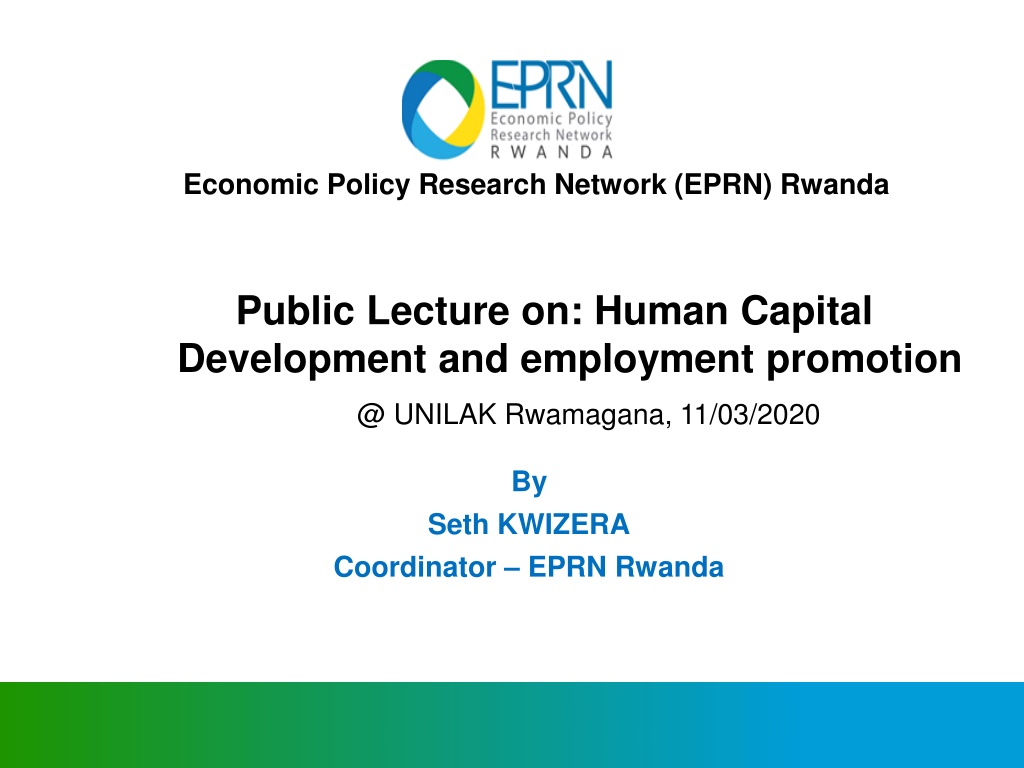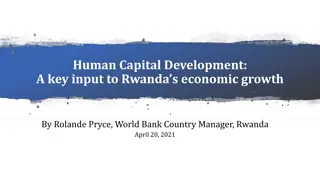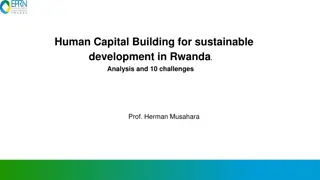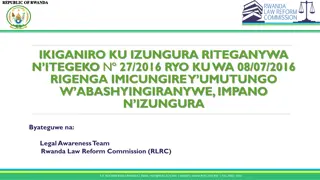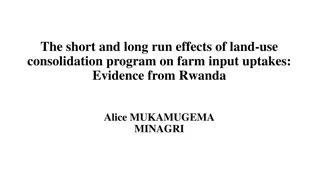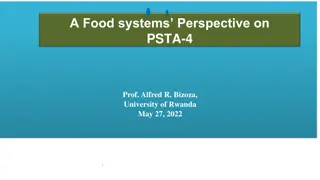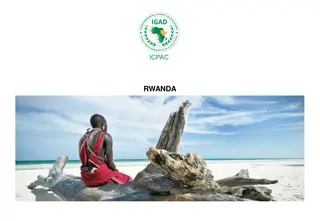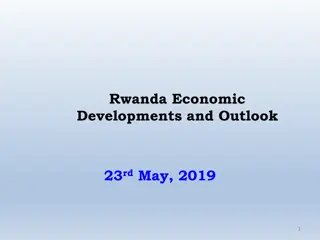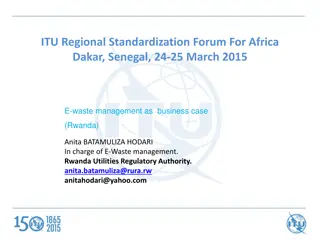Enhancing Human Capital Development and Job Creation in Rwanda
The Economic Policy Research Network (EPRN) in Rwanda conducted a public lecture on Human Capital Development and employment promotion, emphasizing the importance of job creation for economic growth and social progress. The government's vision is to create inclusive and quality jobs, aligning with Sustainable Development Goals and the National Strategy for transformation. Strategic interventions and goals are outlined to target job creation and enhance employment opportunities, particularly focusing on sectors like agro-processing, tourism, and youth business development.
Download Presentation

Please find below an Image/Link to download the presentation.
The content on the website is provided AS IS for your information and personal use only. It may not be sold, licensed, or shared on other websites without obtaining consent from the author. Download presentation by click this link. If you encounter any issues during the download, it is possible that the publisher has removed the file from their server.
E N D
Presentation Transcript
Economic Policy Research Network (EPRN) Rwanda Public Lecture on: Human Capital Development and employment promotion @ UNILAK Rwamagana, 11/03/2020 By Seth KWIZERA Coordinator EPRN Rwanda
Introduction Creation of jobs is crucial to the achievement of economic development and social progress The government vision is to create more jobs ,inclusive jobs and better jobs(the quantity and quality) and this has to be a joint responsibility (public private) The Sustainable Development Goals (Goal 8.) states that there is a need to promote sustained, inclusive and sustainable economic growth, full and productive employment and decent work for all. The National Strategy for transformation (NST) highlights the need to accelerate inclusive economic growth and development founded on the Private Sector, knowledge and Rwanda s Natural towards the Economic Transformation of the country. Among the key strategic interventions 2 Ministry of Trade and Industry 2013 Economic Policy Research Network
Job Creation Vision and Current Status Vision 2020 targets the creation of 200,000 off-farm job a year: National Strategy for Transformation (2018-2024) targets the creation of 1.5 million productive jobs in next 7 years -New comers: 225, 000 fleshly join the Labour Market per year -Current Job creation (2018): Economy generated 206,000 jobs annually National Employment Program is articulated under EDPRS2 and then in NST1 as one of the strategies to increase productive jobs through better planning and coordination of employment initiatives 3 Ministry of Trade and Industry 2013 Economic Policy Research Network
Positioning Employment in 7YGP 7YGP 2017-2024 targets the creation of 1.5 million productive and decent jobs in next 7 years The 7YGP highlight the following job creation strategic interventions: Promotion and incentives to job rich projects in economic activities that are driving employment mainly (Agro processing, Horticulture, Light manufacturing, mining, construction, tourism and hospitality, knowledge based services; and creative arts; Supporting youth in business development services and access to start up capital; Increase TVET enrolment and quality; Monitoring job creation coordination; Supporting a model project per village that creates jobs for youth. performance and enhancing 4 Ministry of Trade and Industry 2013 Economic Policy Research Network
Growth in Business and Employment (Source: EICV 5 PPT) . 31.0 % 466,206 34.5 % 355,883 23.9 % 264,648 24.4 % 183,867 148,376 119,252 Businesses Employment 2017 2011 2014 NISR Establishment Census 2011, 2014 & 2017. 5 Ministry of Trade and Industry 2013 Economic Policy Research Network
Net Jobs Created between 2017 and 2018 (Source: EICV 5 PPT) 6 Ministry of Trade and Industry 2013 Economic Policy Research Network
Share of New Jobs by Industry (Source: EICV 5 PPT) . 30.0% 25.0% 20.0% 15.0% 10.0% 5.0% 0.0% -5.0% 7 Ministry of Trade and Industry 2013 Economic Policy Research Network
Employment changes between 2017 and 2018 Number of jobs (main and secondary) , RLFS 2018 2018 258,829 63,506 199,650 6,157 7,995 328,531 492,120 144,735 71,075 13,827 29,098 3,883 26,488 50,782 60,014 108,553 48,909 9,990 69,567 205,712 17,174 2,216,596 Economic activity 2017 261,120 48,797 157,241 9,702 9,409 276,360 487,020 125,586 45,204 11,223 23,079 3,870 25,446 36,532 55,915 112,092 49,558 10,868 56,299 195,414 9,673 2,010,407 Net change Agriculture forestry and fishing Mining and quarrying Manufacturing Electricity gas stream Water supply, gas and remed Construction Whole sale and retail trade; repair Transportation and storage Accommodation and food services Information and communication Financial and insurance activities Real estate activities Professional, scientific and technical Administrative and support activities Public administration Education Human health and social work Arts, entertainment and recreation Other services Activities of households as employers Activities of extraterritorial org Total (2,291) 14,709 42,409 (3,545) (1,413) 52,171 5,101 19,149 25,871 2,604 6,020 13 1,042 14,250 4,099 (3,539) (649) (878) 13,268 10,298 7,501 206,190 8 Ministry of Trade and Industry 2013 Economic Policy Research Network
Policy actions and Strategies to achieve 1.5million productive and Decent Jobs Through Revised National Employment Policy the following broad interventions will be instrumental to achieve the overall policy objective to unleash Rwanda s full employment potential: Pro-employment macroeconomic framework and sectoral policies; Enterprise development and private sector competitiveness; Agricultural productivity and Rural development; Linkage between education, skills development and labour market needs; Labour mobility and migration; Formalization of informal economy; Strengthening labour market policies and labour market information system; Social protection, working conditions and productive jobs; Promotion of employment opportunities for specific groups. Strengthen Coordination, Monitoring & Evaluation Ministry of Trade and Industry 2013 Economic Policy Research Network 9
Empowering Youth with Quality Jobs to Stimulate the Demographic Dividend in Rwanda Interventions to enhance youth employment should focus on: 1. Strengthening the technical and social skills of youth to prepare them for employment and start businesses, 2. Improving economic infrastructure and business environment to stimulate growth of the private sector. 3. Reducing dependence of the development agenda on donor funding. 10 Ministry of Trade and Industry 2013 Economic Policy Research Network
Underlying Challenges Skills mismatch between education and labour market needs; Limited entrepreneurship, and innovation support system; The design of financial products not adapted to youth demand; High cost of doing business for SMEs; High underemployment rate and predominance of informal sector among youth. 11 Ministry of Trade and Industry 2013 Economic Policy Research Network
Key strategies and policy actions to address underlying challenges Put more focus on job creation in investment promotion and attraction in all sectors of the economy; Strengthen the value chain systems to promote local SMES and link them with large industries and export; Put more focus and incentives on attracting labour intensive and export oriented industries to foster job creation; Improve skills development systems through aligning education curricula with the current and future needs of the labour market; Strengthen systems to identify, attract and upskill youth with rare skills to respond to employers and investment needs; Put in each village a MODEL INCOME AND EMPLOYMENT GENERATING Business by 2024 12 Ministry of Trade and Industry 2013 Economic Policy Research Network
Solutions contd 13 Ministry of Trade and Industry 2013 Economic Policy Research Network
Stakeholder Expectations The target of creating 1,500,000 productive and decent jobs cannot be achieved through fragmented and isolated interventions; The Employment Policy calls for sustained, targeted and concerted efforts from all stakeholders i.e Government institutions, the Private Sector, Development Partners, the Private Sector and the Civil Society, Researchers among others. It is well understood that the contribution of each and every here to achieve the Rwandans aspiration of creating 1.5 million productive and decent work. 14 Ministry of Trade and Industry 2013 Economic Policy Research Network
